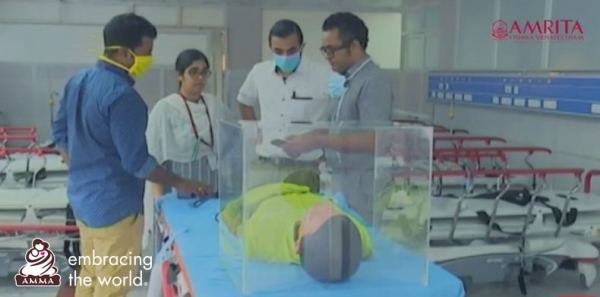“When classes were suspended and the campuses closed, we wanted to use our academic capabilities to help the international fight against the pandemic,” said Dr. Shanti Nair, Dean of Research at Amrita Vishwa Vidyapeetham. “Amrita’s chancellor, Amma, has always stressed targeting research to humanitarian ends. So, we all turned our attention to the challenges faced by medical professionals and began innovating solutions.”
Amrita Centre for Nanosciences & Molecular Medicine Designs Nanomasks to Prevent Infection
As cases of COVID-19 continue to rise, many are being required to wear a face mask in public. In response to this need, a multi-component nano-fibre membrane-based filter device has been developed by the Amrita Centre for Nanosciences and Molecular Medicine and the Amrita Institute of Medical Sciences.
“There is a lack of effective and cost effective medical masks in the world today. Nanomaterials provide an innovative alternative to existing masks,” said Dr. Shantikumar Nair, who heads the team of innovators, including Dr. Deepthy Menon, Professor; Dr. Binulal Sathy, Assistant Professor; and Dr. Reshmi C.R., Research Scientist.
This mask uses a nanotechnology-based filter with the ability to protect a wearer from harmful bacteria and viruses. The innovative nanofiber membrane of the invention is intended to be used as a disposable filter element in the facial mask. The mask itself can be washed and reused.
The mask has been tested using fine droplet mist and shown to be much more effective than standard surgical masks. The innovative membrane can also serve as a filter membrane in an N95 mask. The masks are also cost effective: Rs. 3-6 Rs a mask compared to Rs.10 for a surgical mask and Rs. 150 for an N95 mask.
Low-Cost Face Masks from Mechanical Engineering Students
Three students pursuing Mechanical Engineering degrees at the Amrita School of Engineering, Coimbatore—Raj Praveen, Venkadasubramaniyan and Harisudhan—have developed another low cost mask to aid the fight against COVID-19.
The mask is reusable, and its filtering element can be changed as needed. It allows the common man to benefit from the same level of protection as one would gain from a mask with an advanced filtering element.
Amrita Intubation Box
Some people who have contracted COVID-19 develop severe pneumonia and must be put on a ventilator. To accomplish this, a ventilation tube has to be fed down the patient’s throat. During intubation, it is common for the patient to expel a large amount of highly infectious aerosol mucus, which permeates the atmosphere. Dr. Sundeep Vijayraghavan of the Amrita Institute of Medical Sciences Department of Plastic Surgery has created a three-sided acrylic box to physically separate the intubation team from the patient. Amrita Hospital has already supplied these intubation boxes to the Government Medical Colleges in Kottayam and Ernakulam.
Low-Cost Ventilator Designed by Department of Electrical and Electronics Engineering
With an estimated 10% of COVID-19 patients requiring ventilators, some analysts have determined the world needs approximately nine hundred thousand more ventilators than it currently has.
The Department of Electrical and Electronics Engineering and the Amrita School of Engineering came up with a prototype for a low-cost ventilator. It uses a self inflating Ambu bag and can provide the basic functionality of an advanced ventilator, with limited control-action capabilities. The team is currently iterating on the prototype, providing different modes so that an operator can manually control the duration the ventilator intakes, holds and expresses air.
Remote Patient Monitoring
When dealing with COVID-19-infected patients, healthcare workers have to be extremely careful not to contract the virus themselves. In such situations, the ideal method of monitoring patience is remotely. The use of smartphones and server software can aid in this and thereby minimize the exposure of healthcare personnel to contagious patients.
Amrita University is using smartphones and other similar IP-based camera solutions to periodically capture data from a patient’s bedside monitor. The data arrives at the server in real time.If the data indicates a critical need, health care workers are alerted to tend to the patient in person. This can reduce the need for healthcare personnel to directly attend to patients when not in need of a physical intervention while still providing quality health care.
Amrita Fly-Med System: a Quad Plane During the Pandemic
Because of the lockdown and the need for individuals to be quarantined, the health sector is trying to develop solutions for the delivery of medical aid and other emergency supplies. In an attempt to address this crisis, a team of researchers from Amrita University has developed the Amrita Fly-Med System, a safe and reliable hybrid drone system for delivering medical aid.
The Amrita Fly-Med System combines long-distance service range with the ability to make deliveries to a doorstep. It can deliver packages to specified GPS locations, thereby aiding stranded patients.
Mobile Apps That Assist in the Fight Against COVID-19
A major difficulty for India’s population in lockdown is gaining access to supplies and medical care. In order to help in this area, the students and faculty of the Department of Computer Science Engineering, along with the Department of Aerospace Engineering of Amrita School of Engineering, Coimbatore, have developed two applications: Diagnostix and Pandemix.
Diagnostix helps in diagnosing COVID-19 patients through deep learning and blockchain. Medical staff can upload X-ray images of a patient’s lungs and the system then diagnoses whether the patient is COVID-19 positive or negative.
Pandemix allows the elderly and disabled to order groceries and prescriptions remotely for pick up so that they can limit the amount of time they spend in the stores and waiting in lines. It also connects people stores that can help them gain access to groceries, and prescriptions.
The faculty at Amrita are determined to do their part to fight the current pandemic. “The current situation is almost like being at war,” said Dr. Maneesha. “Such times are really an all-hands-on-deck scenario. We at Amrita all want to do our part. With effort, unity and grace, we will all come out of this before long.”









